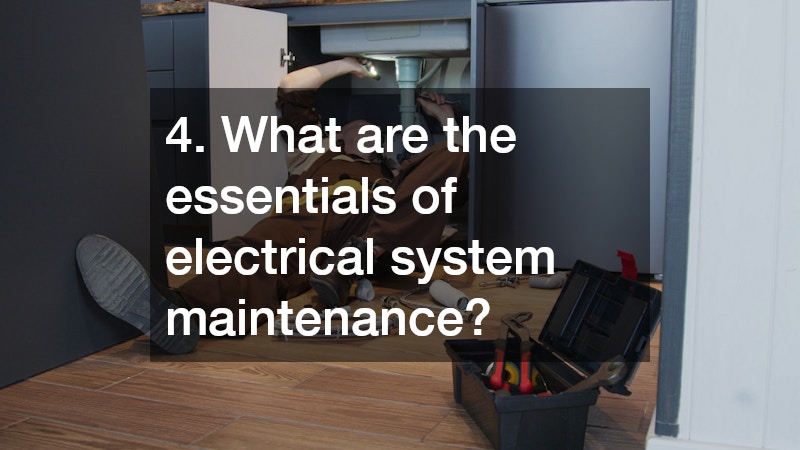Home Maintenance Responsibilities Every Future Homeowner Should Know
Understanding the basics of home maintenance is crucial for every future homeowner. Being equipped with knowledge and skills in maintaining a house safeguards your investment and enhances your living experience. This comprehensive guide highlights essential responsibilities that will help preserve the value and safety of your home. Navigating homeownership is a significant milestone, and this overview will lay the foundation for successfully managing the tasks and nuances involved in maintaining a home.
Future homeowners need to be aware that regular maintenance prevents avoidable expenses and complications. Proactive measures ensure that systems within the home operate efficiently, reducing the need for costly repairs and replacements. Investing time in understanding these responsibilities provides long-term benefits and peace of mind, making the journey of homeownership a rewarding endeavor.
1. How do I maintain my HVAC system?

As a future homeowner, understanding how to maintain your HVAC system is vital to ensuring comfort and efficiency. Regular maintenance checks can prevent unexpected breakdowns and improve energy efficiency, ultimately saving you money. Scheduling a heat pump service annually is a critical step in this process, helping to identify potential issues early and mitigating the risk of costly repairs.
Keeping your HVAC system in good condition also involves simple tasks such as replacing air filters every few months. This can enhance air quality and prolong the lifespan of your equipment. Additionally, inspecting and cleaning ducts and vents helps maintain the system’s efficiency and prevents blockages that could escalate into more significant problems.
For future homeowners, it’s beneficial to have a reliable HVAC company on hand to assist with complex maintenance tasks. Professional services ensure that all components of your system work together seamlessly. With an understanding of HVAC maintenance, you can ensure a comfortable and efficient home environment year-round.
2. What should I know about plumbing maintenance?
Maintaining your plumbing system is another crucial responsibility for future homeowners. Regular inspections can help identify leaks, clogs, and other potential problems before they require major intervention. By working with reputable plumbing companies, future homeowners can ensure that their water systems are functioning efficiently and reliably.
Preventive measures like insulating pipes during colder months can help avoid costly repairs due to burst pipes or water damage. It’s also essential to understand how to shut off your home’s water supply in case of emergencies. This knowledge can prevent minor issues from becoming significant disasters, protecting both your property and finances.
For homes reliant on wells, understanding the basics of well maintenance is vital. Partnering with well drilling companies ensures your water source remains clean and safe. Consistent upkeep of your plumbing system is not only about addressing immediate concerns but also involves maintaining its overall health and longevity.
3. How to take care of your roof?
The roof is a crucial component that every future homeowner must maintain diligently. Regular roof inspections prevent minor issues from escalating into major problems, which can result in costly repairs or even premature roof replacement. Employing concrete services for repairs can help maintain the roof’s integrity and ensure protection against the elements.
Routine maintenance tasks include clearing debris from gutters and downspouts to prevent water damage. Inspecting the roof for signs of wear, such as missing shingles or leaks, is vital. By taking these measures, future homeowners can extend the life of their roofs, providing security and safety for their homes.
To achieve the best results, consider working with a trusted roofing company. These experts provide detailed inspections and professional maintenance that support the longevity of your roof. Understanding the significance of roof maintenance empowers future homeowners to protect their properties from unnecessary damage.
4. What are the essentials of electrical system maintenance?

Understanding your home’s electrical system is a fundamental responsibility for future homeowners. Regular inspections ensure everything is functioning correctly and can prevent dangerous electrical issues, such as short circuits or fire hazards. Collaborating with a reputable plumbing company can help identify potential cross-issues where plumbing might affect electrical setups.
Ensure all electrical components, such as wiring, outlets, and switchboards, are in good condition and updated to the latest safety standards. Testing your circuit breakers regularly can prevent uncomfortable power losses and reduce the risk of more severe electrical issues. Future homeowners should be proactive in learning about these maintenance practices to ensure the safety of their homes.
For complex electrical problems or updates, hiring qualified technicians provides peace of mind. These professionals can handle intricate tasks and ensure compliance with local codes and regulations. By focusing on regular electrical system maintenance, future homeowners can minimize risks and enhance the home’s overall safety.
5. How should I maintain my home’s exterior?
Maintaining your home’s exterior is crucial for preserving its aesthetic and functional aspects. Future homeowners should regularly assess their siding for signs of wear or damage to prolong its life and prevent water infiltration. Employing a siding company for periodic inspections and repairs is a wise investment in your home’s appearance and structural integrity.
Another priority is maintaining your driveway and walkways, ensuring they remain safe and free of cracks. Utilizing concrete services provides solutions for patching or resurfacing damaged areas, prolonging their lifespan, and enhancing curb appeal. Routine cleaning and maintenance of these areas protects your investment and improves the overall appearance of your property.
Finally, paying attention to landscaping can help protect the home’s foundation and structural integrity. Planting trees and shrubs at a safe distance from the house ensures roots do not damage foundations or underground pipes. A consistent exterior maintenance routine improves your living environment and elevates the value of your property.
6. How important is pest control for homeowners?
Pest control is a crucial aspect of maintaining a safe and healthy home. As a future homeowner, understanding the importance of a regular pest control schedule can protect your property from damage caused by various pests. Collaborating with local pest control services can provide tailored solutions to prevent infestations and ensure a pest-free environment.
Regularly inspecting the home for signs of pest activity, such as droppings, nests, or noises, is a proactive approach to managing this issue. Addressing minor infestations immediately can prevent more severe problems, which could lead to structural damage and health risks. Being vigilant about pest control can save time and money by avoiding extensive remediation efforts.
In addition to professional services, future homeowners can adopt preventive measures such as sealing entry points, maintaining proper waste management, and reducing clutter. These strategies help create an unwelcoming environment for pests. Effective pest control requires a balanced combination of professional intervention and informed actions, adding to the overall maintenance and safety of your home.
7. What seasonal maintenance should I perform?

Seasonal maintenance is critical for future homeowners, as it prepares your home for upcoming weather conditions and prolongs the lifespan of its components. Spring is a great time to focus on outdoor spaces, ensuring that garden beds, gutters, and roofs are clean and free from debris. Collaborating with a pool company can assist in preparing your pool for the warmer months ahead.
Summer tasks often center around HVAC maintenance to ensure your cooling systems operate efficiently during peak usage. Fall is ideal for inspecting your heating systems and making any necessary repairs or upgrades, ensuring effective performance during winter. This proactive approach to seasonal maintenance prevents unexpected issues and optimizes your home’s energy efficiency.
In the winter, insulating pipes and checking for drafts can maintain comfortable indoor conditions and prevent damage from cold weather. Reviewing emergency preparedness plans and supplies ensures that future homeowners are ready for any seasonal challenges. Consistent seasonal maintenance is essential in preserving your home’s value and ensuring its continued functionality.
8. How do I maintain my indoor air quality?
Maintaining good indoor air quality is crucial for health and well-being, making it a priority for future homeowners. Regularly replacing HVAC filters and investing in air purifiers can help remove contaminants and allergens from the environment. Collaborating with a siding company for proper insulation and ventilation upgrades ensures optimal air circulation within the home.
Keeping your home free from dust and pollutants through regular cleaning is equally important. Using environmentally friendly cleaning products reduces harmful emissions that can degrade air quality. Regular inspections of your ventilation system prevent the buildup of mold and other harmful substances, which can have serious health implications.
Future homeowners should also consider the role of humidity levels in maintaining indoor air quality. Utilizing dehumidifiers in damp areas, such as basements, prevents mold growth and protects both your health and property. By prioritizing indoor air quality, you create a healthier and more comfortable living environment for you and your family.
9. What should I know about appliance maintenance?
Regular appliance maintenance is essential for future homeowners to ensure their homes run efficiently and cost-effectively. Common tasks involve cleaning the interiors and exteriors of major appliances like refrigerators, ovens, dishwashers, and washing machines, which prevents wear and extends their lifespans. Consulting general contractors for comprehensive assessments can provide insights into necessary upgrades or repairs.
Beyond cleaning, it is important to perform periodic checks on connections and safety features. For instance, ensuring that gas appliances are properly ventilated and electric appliances have secure wiring minimizes risk and enhances performance. Understanding appliance requirements and schedules for maintenance enables future homeowners to prevent inefficiencies and hazards.
Attention to smaller appliances should not be overlooked either. Items like microwaves, coffee makers, and air conditioners also require regular cleaning and filter replacements to maintain efficiency. Neglecting these devices can lead to reduced performance or costly replacements that could have been avoided with simple upkeep. Creating a maintenance calendar is an effective way to track routine tasks, such as replacing refrigerator water filters every six months or scheduling annual dryer vent cleanings to prevent fire hazards.
Having a trusted technician for complex maintenance tasks ensures that all appliances are safe and efficiently operating. Professional services may include deep cleaning, calibration, and safety inspections that go beyond what a homeowner can typically handle. This expert support complements routine homeowner care and provides a layer of assurance that everything is functioning properly.
Regular attention to these essential components of home living provides peace of mind and ensures optimal energy usage. For future homeowners, prioritizing appliance maintenance not only saves money but also contributes to an enhanced quality of life by fostering comfort, reliability, and safety within the home. Ultimately, viewing appliance care as an investment rather than a chore helps protect both household efficiency and long-term property value.
10. How do I manage home safety and security?

Home safety and security are paramount concerns for future homeowners wanting to protect their property and loved ones. Creating a comprehensive safety plan that includes updated locks, security systems, and motion-activated lighting offers multiple layers of protection. Collaborating with an HVAC company for climate control security systems can add an extra level of technological security management.
Regularly test smoke and carbon monoxide detectors to ensure they are fully operational, replacing batteries at least once a year. An emergency preparedness plan that includes contact numbers and procedures for various scenarios can provide additional peace of mind. Encouraging all inhabitants to familiarize themselves with security protocols contributes to comprehensive home safety.
Balancing high-tech solutions like smart home systems with physical safety measures, such as deadbolts and security cameras, covers both modern and traditional approaches. Future homeowners need to regularly review and update their security measures to address evolving challenges. Staying proactive about home security ensures a safer and more secure environment for future homeowners.
Embracing these home maintenance responsibilities will ensure that as a future homeowner, you can enjoy a safe, efficient, and valuable home. Regular maintenance not only preserves and enhances your property but also provides peace of mind knowing your investment and family are protected. From HVAC systems to pest control and everything in between, careful attention to these aspects creates an environment conducive to comfort and stability.
Being informed about the varied tasks associated with homeownership empowers you to anticipate and address issues before they arise. As a future homeowner, prioritizing these responsibilities as part of a maintenance routine promises long-term success and satisfaction. This approach guarantees that your home remains a safe haven, contributing positively to your quality of life and property value over time.






